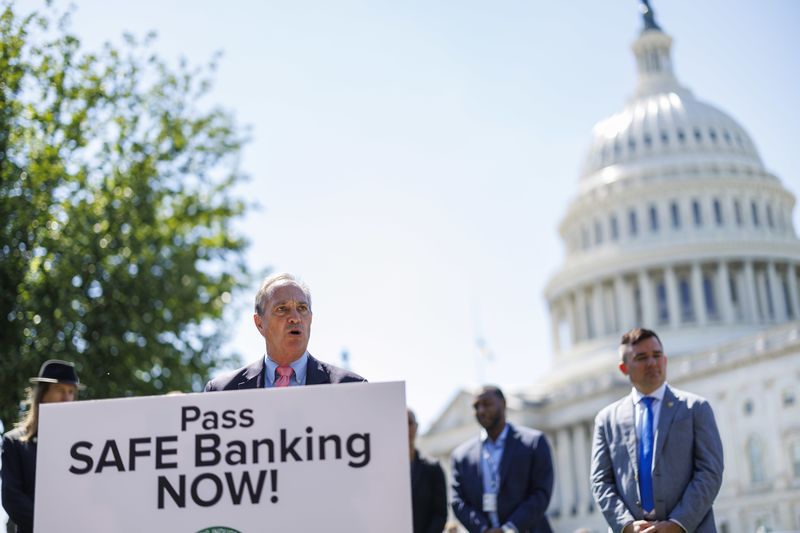Representative Ed Perlmutter, a Democrat from Colorado, speaks outside the US Capitol earlier this year about the SAFE Banking Act.
Follow the money as Tiffany Kary shows you how once-illegal drugs like marijuana and psychedelics are becoming big business.
Welcome to my latest look at the cannabis and psychedelics industries. Stalled attempts to get a piece of banking legislation through Washington were the focus of marijuana companies last week, even as New York City’s plan to deliver weed by bike showed that states are forging a new path ahead, come what may.
Un-SAFE banking?
The cannabis industry failed to get the banking legislation it wanted yet again last week — but so-called SAFE Banking may not have been the panacea that many had hoped for.
There’s still a sliver of hope that the bill, which failed to get attached to the defense budget last week, may yet get attached to an omnibus funding package before the end of the year. But even if it doesn’t, many say it won’t be the end of the world for a battle-hardened industry that has already found workarounds. In fact, keeping an industry that’s prone to hype more lean could even have some benefits.
Companies hope that if SAFE passes, they will gain more institutional investors, list on major stock exchanges and stop operating in mountains of unwieldy cash. Yet they’ve already found workarounds to many of these problems. Because retailers can’t take credit cards, many turned to cashless ATMs (and are now adopting other alternatives, as cashless ATMs shut down). State-charted banks and credit unions have also created a booming business in serving cannabis companies.
Still, the industry saw the bill as symbolic — and a potential sign that the winds in Washington were shifting in favor of marijuana.
“I think the importance of SAFE lies more in the signaling of what it represents for change at the federal level,” said Emily Paxhia, the founder of cannabis investment fund Poseidon Asset Management, contrasting it with more substantive legal changes that would come if the US were to take marijuana off its list of the most dangerous drugs.
Even if SAFE does pass, the largest, most conservative institutions would likely take their time in embracing the industry, said Rasul Raheem, senior counsel in the Detroit office of law firm Dykema Gossett.
“I don’t see the big banks getting into this area, you’ll mostly see the smaller banks,” Raheem said. He noted that because there’s still drug-cartel activity in the marijuana space, banks will want to tread cautiously to make sure the banking system is protected from infiltration by illegal actors.
Robert DiPisa, chair of Cole Schotz’s Cannabis Law Group, predicted that it could take a year or more before big banks would serve the industry after passage of a banking bill. Even then, they’d be likely to pass hefty compliance costs on to their cannabis customers.
One of the main problems SAFE Banking would solve is the ability of cannabis companies to get real estate, given how reluctant landlords’ lenders have been to deal with the marijuana industry, he said.
“I see so many transactions die, and fall through, and operators that can’t expand” because landlords don’t want to change to a smaller bank that will work with a cannabis client, DiPisa said.
Vince Ning, founder of Nabis, a cannabis wholesale platform in California, said that if SAFE doesn’t pass, there could be a silver lining. Without a flood of new money, cannabis companies will be forced to fix operational inefficiencies rather than just patch holes. Additionally, other states can hopefully avoid the bubble effect as new participants rush into the market, Ning said. That sudden interest has led to an oversupply of raw flower in California, depressing wholesale market prices.
“The problem of oversupply of flower today in California largely exists because there was a lot of capital support to built infrastructure, to be as widespread as possible,” he said. “The capacity to produce in California was gargantuan, they had to put it to use. It ended up flooding the market.”
H/T: www.bloomberg.com



